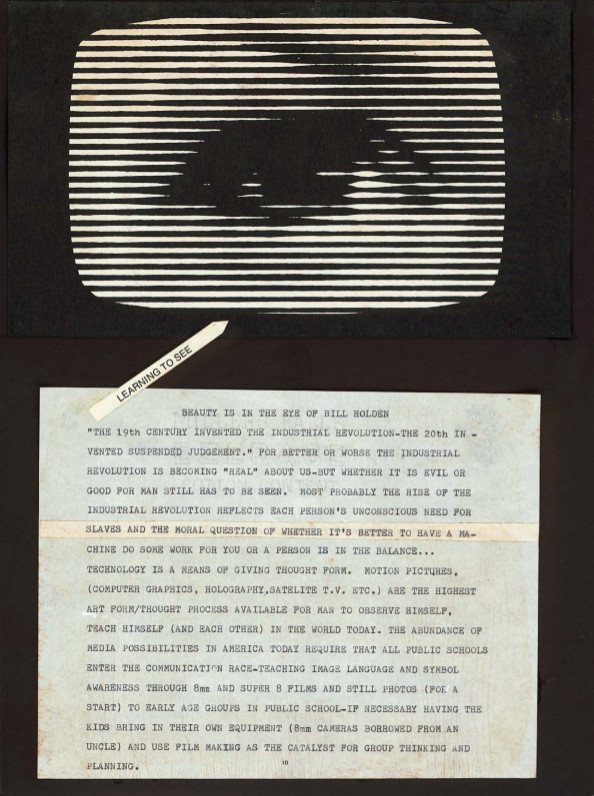Stan VanDerBeek: Violence Sonata / The History of Violence in America (1970)
Filed under artist publishing | Tags: · art, collage, education, machine, mass media, media, participation, performance, technology, television, violence

Stan VanDerBeek was part of the “Rockefeller Artists-in-Television” residency program at Boston public television station WGBH from 1969–1970, during which time he produced the simulcast television program Violence Sonata. The program, directed by David Atwood and Fred Barzyk, was transmitted simultaneously on both Channels 2 and 44 on January 12, 1970, with the suggestion that viewers place two television sets side-by-side. Following sonata form, the piece is composed of three segments: “Man,” “Man to Woman,” and “Man to Man.” The simultaneous broadcast consisted of material VanDerBeek composed from previous films, archival and newsreel footage, video shot in Boston for the show, and filmed collages, further manipulated and enhanced through overlays and color saturation. Sections of the broadcast were played before a live studio audience, with actors also performing a play written by VanDerBeek for the show. Home viewers were encouraged to call in their responses to the program between the acts. The series of collages entitled The History of Violence in America was conceived as layouts for reproduction and publication in a booklet to accompany the broadcast.
Commentary: Melissa Ragain (X-TRA, 2012).
Video excerpt (Violence Sonata)
PDF (Violence Sonata – script, photo documentation, sketches, collages, reviews)
PDF (The History of Violence in America, 22 pages)
David Graeber: Revolutions in Reverse: Essays on Politics, Violence, Art and Imagination (2011)
Filed under book | Tags: · altruism, anarchism, anthropology, art, autonomy, capitalism, communism, debt, politics, violence

Capitalism as we know it appears to be coming apart. But as financial institutions stagger and crumble, there is no obvious alternative. There is good reason to believe that, in a generation or so, capitalism will no longer exist: for the simple reason that it’s impossible to maintain an engine of perpetual growth forever on a finite planet. Yet faced with this prospect, the knee-jerk reaction is often to cling to what exists because they simply can’t imagine an alternative that wouldn’t be even more oppressive and destructive. The political imagination seems to have reached an impasse. Or has it?
In this collection of essays David Graeber explores a wide-ranging set of topics including political strategy, global trade, debt, imagination, violence, aesthetics, alienation, and creativity. Written in the wake of the anti-globalization movement and the rise of the war on terror, these essays survey the political landscape for signs of hope in unexpected places.
At a moment when the old assumption about politics and power have been irrefutably broken the only real choice is to begin again: to create a new language, a new common sense, about what people basically are and what it is reasonable for them to expect from the world, and from each other. In this volume Graeber draws from the realms of politics, art, and the imagination to start this conversation and to suggest that that the task might not be nearly so daunting as we’d be given to imagine.
Publisher Minor Compositions, an imprint of Autonomedia, November 2011
ISBN 1570272433, 978-1-57027-243-1
120 pages
PDF (PDF; updated on 2012-8-26)
PDF (EPUB; added on 2012-8-26)
PDF (MOBI; added on 2012-8-26)
View online (Scribd.com)
Alain Joxe: Empire of Disorder (2002)
Filed under book | Tags: · balkans, chechnya, democracy, economy, empire, fascism, globalisation, kosovo, military, neoliberalism, philosophy, politics, serbia, sovereignty, strategy, violence, war, yugoslavia

“Globalization is quickly turning the world into a chaos, leading to an increasing disparity between rich and poor, the rise of an international, rootless ‘noble class,’ and an escalating number of endless cruel little wars. Yet the United States refuses to conquer the world and assume the protective imperial role for the societies it subjugates. Instead, it operates on a case-by-case basis, regulating disorder, repressing the symptoms of despair instead of attacking its cause. For the first time perhaps, humanity has embarked on an ocean of disorder with no final order in sight.”
Translated by Ames Hodges
Edited by Sylvère Lotringer
Publisher Semiotext(e), 2002
Active Agents series
ISBN 1584350164, 9781584350163
221 pages
PDF (updated on 2012-7-26)
Comment (0)
